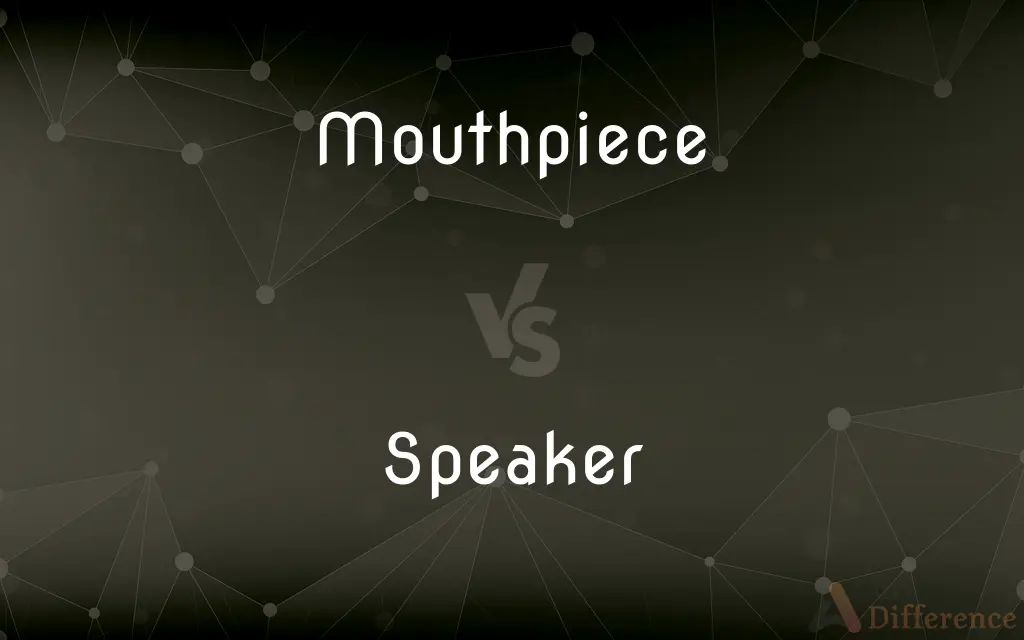Mouthpiece vs. Speaker — What's the Difference?
By Fiza Rafique & Urooj Arif — Updated on May 2, 2024
A mouthpiece refers to the part of a device placed near the mouth to transmit sound, commonly in telephones, while a speaker is a device that emits sound, converting electrical signals into audible noise.

Difference Between Mouthpiece and Speaker
Table of Contents
ADVERTISEMENT
Key Differences
A mouthpiece is primarily a component of telecommunication devices like telephones, where it is positioned near the mouth to capture and transmit sound. In contrast, a speaker is a standalone or integrated device designed to output sound, typically found in audio systems, computers, and various electronic devices.
The function of a mouthpiece is to facilitate clear audio capture, converting sound waves from speech into electrical signals. On the other hand, speakers convert electrical audio signals back into sound waves, effectively reproducing sounds ranging from voice to music.
In terms of technology, mouthpieces use microphones internally, which are optimized for voice frequencies and designed to reduce background noise. Whereas speakers can vary widely in type and size, from small portable units to large sound system components, and are designed to cover a broader range of audio frequencies.
Mouthpieces are crucial for communication devices as they enable effective two-way communication by capturing sound with clarity and minimal distortion. Meanwhile, speakers play a vital role in entertainment, education, and information dissemination, providing audio output that can be heard by individuals or groups.
While a mouthpiece is often a part of a device that includes other components like a speaker (as in a telephone handset), a speaker functions independently or as part of a larger audio system. This distinction highlights their roles in audio input versus output in technological devices.
ADVERTISEMENT
Comparison Chart
Function
Captures sound to transmit as electrical signals.
Converts electrical signals into audible sound.
Usage
Used in phones, headsets, and radios.
Used in music systems, TVs, computers, etc.
Technology
Includes a microphone internally.
Varies from dynamic drivers to tweeters.
Primary Role
Facilitates two-way communication.
Provides audio output for entertainment and alerts.
Design Focus
Optimized for clarity in voice capture.
Designed for a wide range of sound frequencies.
Compare with Definitions
Mouthpiece
Focuses on voice clarity.
High-quality mouthpieces filter out background noise.
Speaker
Varies in size and power.
She bought a small Bluetooth speaker for her desk.
Mouthpiece
Integral to effective communication.
Damaged mouthpieces can greatly reduce call quality.
Speaker
Can be tailored for specific sound ranges.
The studio monitors are specialized speakers that provide accurate audio feedback.
Mouthpiece
Captures audio for transmission.
Ensure the mouthpiece is unobstructed when recording a message.
Speaker
One who speaks.
Mouthpiece
Typically found in communication devices.
The radio’s mouthpiece was adjusted for better sound capture during the broadcast.
Speaker
A spokesperson.
Mouthpiece
Part of a device used for speaking into.
The telephone's mouthpiece needs to be directly in front of your mouth for clear audio.
Speaker
One who delivers a public speech.
Mouthpiece
A part, as of a musical instrument or a telephone, that functions in or near the mouth.
Speaker
Often Speaker The presiding officer of a legislative assembly.
Mouthpiece
(Sports) A rubber or flexible plastic protective device worn over the teeth, as by boxers.
Speaker
The person, sometimes the actual writer but often an assumed character, who is imagined as the source of the words or ideas expressed in a poem.
Mouthpiece
(Informal) One, such as a spokesperson, through which views are expressed.
Speaker
A device that converts electric signals to audible sound.
Mouthpiece
(Slang) A lawyer.
Speaker
One who speaks.
There were three different speakers, but I couldn't make out their accents.
Mouthpiece
A part of any device that functions in or near the mouth, especially:
Speaker
Loudspeaker.
She lost her hearing after standing too close to the speaker at the festival.
Mouthpiece
The part of a telephone that is held close to the mouth.
Speaker
Speakerphone.
Mouthpiece
The part of a wind instrument that is held in or against the mouth.
Speaker
(politics) The chair or presiding officer of certain legislative bodies, such as the U.K. House of Commons or the U.S. House of Representatives.
Mouthpiece
A spokesman; one who speaks on behalf of someone else.
The novel's protagonist serves as a mouthpiece for the author's political views.
Speaker
One who makes a speech to an audience.
The company hired a motivational speaker to boost morale.
Mouthpiece
(slang) A lawyer for the defense.
Speaker
(US) A book containing passages of text for use in speeches.
Mouthpiece
The part of a musical or other instrument to which the mouth is applied in using it; as, the mouthpiece of a bugle, or of a tobacco pipe.
Speaker
The producer of a given utterance, whether speech or text.
Mouthpiece
An appendage to an inlet or outlet opening of a pipe or vessel, to direct or facilitate the inflow or outflow of a fluid.
Speaker
(poetry) The literary character uttering the lyrics of a poem or song, as opposed to the author writing the words of that character.
Popular culture often incorrectly attributes quotes from the speakers of poems or songs to the authors thereof, as when "I took the one less traveled by" is attributed to Robert Frost rather than to the speaker in Frost's "The Road Not Taken".
Mouthpiece
One who delivers the opinion of others or of another; a spokesman; as, the mouthpiece of his party.
Egmont was imprudent enough to make himself the mouthpiece of their remonstrance.
Speaker
(music) A key on a woodwind instrument of the clarinet family (cf octave key on other instruments) which induces the instrument to overblow.
Mouthpiece
A person's lawyer.
Speaker
One who speaks.
Mouthpiece
A part that goes over or into the mouth of a person;
The mouthpiece of a respirator
Speaker
A book of selections for declamation.
Mouthpiece
An acoustic device; the part of a telephone into which a person speaks
Speaker
Someone who expresses in language; someone who talks (especially someone who delivers a public speech or someone especially garrulous);
The speaker at commencement
An utterer of useful maxims
Mouthpiece
A spokesperson (as a lawyer)
Speaker
Electro-acoustic transducer that converts electrical signals into sounds loud enough to be heard at a distance
Mouthpiece
(especially boxing) equipment that protects an athlete's mouth
Speaker
The presiding officer of a deliberative assembly;
The leader of the majority party is the Speaker of the House of Representatives
Mouthpiece
The tube of a pipe or cigarette holder that a smoker holds in the mouth
Speaker
Device that emits sound from electrical signals.
The speaker on her computer was loud enough for the entire room to hear the presentation.
Mouthpiece
The aperture of a wind instrument into which the player blows directly
Speaker
Key component in audio systems.
His new home theater system came with four high-definition speakers.
Speaker
Enhances listening experience.
The concert hall was equipped with state-of-the-art speakers for optimal sound quality.
Common Curiosities
What is the main difference between a mouthpiece and a speaker?
A mouthpiece captures sound for transmission, while a speaker outputs sound.
How do I improve the performance of my mouthpiece?
Keep it clean and unobstructed, and use devices designed for clear voice capture.
Can a device contain both a mouthpiece and a speaker?
Yes, many devices like telephones and headsets contain both components.
What types of speakers are there?
There are several, including dynamic, tweeter, subwoofer, and full-range speakers.
Are speakers in laptops and phones of good quality?
They can vary, but typically they are designed for basic use and may not match external speakers in quality.
How does the technology in mouthpieces reduce noise?
They often include noise-canceling features that filter out background sounds.
What role does a speaker play in a home theater system?
It provides audio output that enhances the movie-watching experience with surround sound.
Can a damaged speaker affect sound quality?
Yes, damages can lead to distorted or reduced sound quality.
How important is the placement of speakers in a sound system?
Very important, as placement affects sound quality and the overall audio experience.
What advancements have been made in speaker technology?
Recent advancements include improvements in wireless technology, sound clarity, and power efficiency.
Is a mouthpiece the same as a microphone?
Essentially, yes, as both capture sound, but a mouthpiece is specifically designed for direct speech input in devices.
Are there wireless speakers?
Yes, there are many wireless options, including Bluetooth and Wi-Fi speakers.
How can I choose the right speaker for my needs?
Consider the size of the room, the type of audio you enjoy, and your budget.
What should I look for in a high-quality mouthpiece?
Look for clarity in voice capture, noise cancellation, and compatibility with your device.
Can both mouthpieces and speakers be repaired if damaged?
Yes, both can often be repaired, but it depends on the extent of the damage and the design of the device.
Share Your Discovery

Previous Comparison
Conservative vs. Traditionalist
Next Comparison
Huntsman vs. HunterAuthor Spotlight
Written by
Fiza RafiqueFiza Rafique is a skilled content writer at AskDifference.com, where she meticulously refines and enhances written pieces. Drawing from her vast editorial expertise, Fiza ensures clarity, accuracy, and precision in every article. Passionate about language, she continually seeks to elevate the quality of content for readers worldwide.
Co-written by
Urooj ArifUrooj is a skilled content writer at Ask Difference, known for her exceptional ability to simplify complex topics into engaging and informative content. With a passion for research and a flair for clear, concise writing, she consistently delivers articles that resonate with our diverse audience.
















































